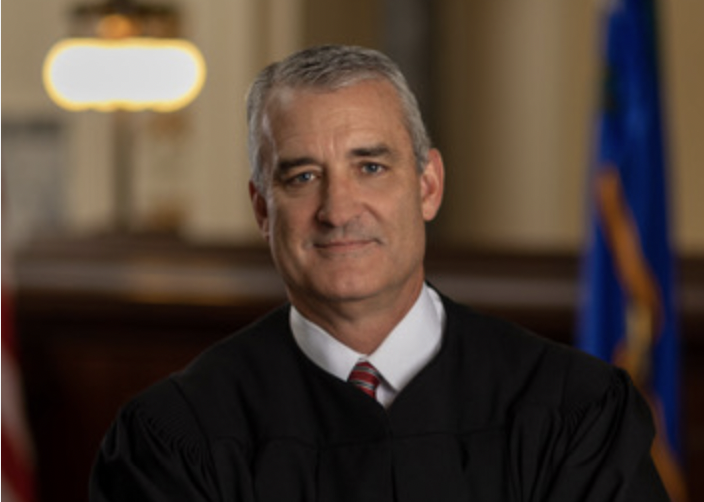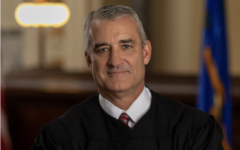
Judge David Hardy (Photo: Washoe District Courts)
Judge Guts Trackergate, Dismisses Claims of Doxxing, Negligence
Decision was preceded by an Amicus Brief filed in the NV Supreme Court by the Vice Chair of the Standing Committee on Judicial Ethics
By Megan Barth, July 18, 2023 6:40 pm
Washoe County District Court Judge David Hardy dismissed four out of eight counts last Friday in a case known as Trackergate, brought by Reno Mayor Hillary Schieve and former Washoe County Commissioner Von Hartung against private investigator David McNeely of 5 Alpha Industries and an unknown individual, John Doe, who hired him. (see below)
As reported by This is Reno:
Three of the claims, which include doxxing, negligence and a request for declaratory relief, were dismissed.
McNeely’s lawyers fought to keep his client’s identity secret, noting that “the Nevada Supreme Court has held that client information may be considered a trade secret.” At the time, defense attorney Brian Hardy charged that Mayor Schieve filed the civil lawsuit for “the sole purpose of forcing our Clients to disclose the identity of their client.”
However, Judge Hardy ruled in favor of the plaintiff’s, writing: “The protection Mr. McNeely seeks could create unfettered immunity for a tortfeasor who acted through an investigator – either as a tacit, unknowing participant or an intentional co-conspirator…This outcome is not contemplated by Nevada law and would work an injustice to plaintiffs who suffer tortious invasions to privacy.”
Days after Hardy’s ruling, the client “John Doe” filed a motion for summary judgement and revealed that he had not ordered McNeely to place the tracking device. John Doe further claimed that “Defendant John Doe is a resident of Washoe County who is concerned with potential corruption and malfeasance in local government.” John Doe says he hired McNeely to investigate “serious misconduct” by Schieve and Hartung.
“In light of the serious nature of the allegations against Schieve and Hartung, and because Doe wanted to avoid any potential defamation or libel claims if those allegations turned out to be untrue, Doe legally retained the services of 5 Alpha Industries, a State-licensed private investigation firm owned by licensed private investigator David McNeely, to investigate the allegations against Schieve and Hartung,” the motion says.
John Doe’s case is now pending in the Nevada Supreme Court.
Another timely twist in the case came through an amicus brief filed by Rost C. Olsen, an attorney for the state’s Public Utilities Commission and the Vice Chair of the Standing Committee on Judicial Ethics of the Nevada State Bar. The brief was filed three hours prior to Hardy’s decision. (see below)
Olsen contends that as one of 17,000 state employees:
Granting this writ would not just affect elected officials. Rather, it would set disastrous precedent for the rank-and-file workers in our state workforce, such as Undersigned, who wish to do their jobs and go about their lives peacefully without tortious harassment from conspiracists armed with private investigators. (emphasis added)
If granted, the relief sought by Petitioners would set a disturbing precedent essentially allowing principals to use private investigators as agents to engage in tortious behavior against public employees such as Undersigned. It would bless a course of conduct allowing quixotic self-proclaimed government watchdogs to use private investigators to trespass against their neighbors working for public entities. Such a precedent would not only affect elected and appointed officials, but even unelected and unappointed state, county, and local workers, such as Undersigned. (emphasis added)
The issuance of this writ would not only affect the rights of elected and appointed officials who are parties in this matter, but would also affect the rights of non-party rank- and-file public employees, such as Undersigned, who are unelected and unappointed. Allowing the filing of Undersigned’s Brief would permit the Court to hear and consider the perspective of one such rank-and-file state employee.
Olsen’s “Hail Mary” in this case raises some eyebrows due to his failure to disclose his current position as Vice Chair on the Standing Committee on Judicial Ethics, where Judge Hardy serves as member. In the Amicus Brief, he simply presents himself as a low-level, unelected bureaucrat frightened of “conspiracy theorists armed with private investigators.”
Oddly, he seemingly believes he is representing all 17,000 state employees–which he isn’t authorized or retained to do so. Should the state feel strongly about this case, they could involve themselves, or, his employer, the Nevada Utilities Commission could initiate their involvement.
Yet, Olsen’s brief may be moot as the Nevada Legislature passed Assembly Bill 356 this legislative session which expressly prohibits individuals from using tracking devices without a warrant.
This is a developing story.
2023-07-13 Rost Olsen - Amicus Curiae Rost C. Olsens Motion for Leave to File Amicus Brief Rost Olson- Illegal Alien Identified As Wrong-Way Driver in Fatal Crash That Killed LVMPD Officer - December 23, 2024
- Senator Rosen Joins Letter Raising Concerns About Pete Hegseth’s Nomination - December 20, 2024
- NV SOS Launches Four Investigations Into 2024 Election Violations - December 20, 2024





One thought on “Judge Guts Trackergate, Dismisses Claims of Doxxing, Negligence”